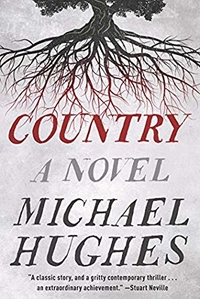Country by Michael Hughes
 Monday, September 30, 2019 at 8:35AM
Monday, September 30, 2019 at 8:35AM 
Published in the UK in 2018; published digitally by HarperCollins on Oct. 1, 2019
Country offers different perspectives on the Troubles, as seen by key characters on both sides of the border between Ireland and Northern Ireland. It is 1994 and the generation of men who signed up to fight for a united Ireland are sick of the conflict. The IRA is splintering. Peace might finally be at hand — a ceasefire is imminent — but a determined group of Republicans want to continue the fight. Country tells the story of a small group of Provisional IRA fighters as they battle British soldiers, Protestant loyalists, informers, and each other.
A dispute between Pig (the group’s leader) and Achill (its feared sniper) concerning the ownership of the teenage girls who warm their beds at night endangers the group’s goal of unsettling the peace talks between the British and the IRA. The story then follows Nellie as she is enticed by the British to become an informer. She is dating (and eventually weds for the sake of appearances) a member of the IRA named Brian Campbell, but she spends their brief marriage scheming a way to get out of Ireland and begin a better life.
The story follows Pig’s brother Dog before it focuses on Henry Morrow, a captain in the SAS who is tasked with contacting the fighters to get a sense of their willingness to support peace negotiations. The spotlight then shifts to Pig, who feels betrayed by IRA leadership. He feel the tide turning. Locals welcome the ceasefire, yearn for an end to checkpoints. Pig won’t stand to see his years of struggle come to nothing.
The story develops the backgrounds of the IRA fighters — the hardcore few who are determined to thwart peace — in unflattering detail. If they were not killing on behalf of the IRA, they would be finding some other way to channel the violence that has been bred in their bones. One wishes he lived in the age of Braveheart so he could hack the British into pieces with his sword. Others don’t enjoy killing but are so caught up in the cause that they have lost all perspective. They kill their own for the smallest reasons — repairing cars for the police becomes a capital crime. These men have legitimate grievances, but the novel suggests that it should have been clear by 1994 that violence was only delaying the objectives they hoped to achieve.
In one of the strongest scenes, men discuss the pride that drives them. Pride in being Irish, pride in being hard men. Yet Achill knows that the English are proud to be English. Having been humiliated by Pig, Achill is too proud to continue the fight under Pig’s command. Pride causes men to fight and it causes them to stop fighting.
There are times when characters from both sides acknowledge that Catholic or Protestant, Irish or British, they are all members of the human race. They bond over football and ancestry and beer. A man who meets with Henry has grudging admiration for the soldier, while Henry feels the same. On occasion, men on both sides will decide not to kill, but when they believe that killing is necessary, no amount of admiration for the opponent will stop them, regardless of which side of the conflict they support. Violence blinds them to the possibility of no violence.
Country tells a fascinating story, but it has a couple of weaknesses. The IRA members love to give speeches to each other, and then praise each other for “a good spake, not a word out of place,” as if they were all students of rhetorical criticism. And while that may accurately reflect the Irish gift of gab, the endless speechifying becomes tedious at points. At the same time, I gather the novel is supposed to evoke Homer’s Iliad, so the dialog is likely meant to serve that purpose.
I also wonder whether the portrayal of the IRA members as hooligans who quarrel about their collections of 14-year-old girls might reflect the bias of an author who grew up in Northern Ireland. Still, while the IRA members are stereotypes of evil, Hughes does make a point of humanizing them, acknowledging that there is some justice in their cause, if not in their use of violence to thwart peace.
In the end, I tend to soak up the lyrical prose of nearly all Irish writers, and Country is no exception. The prose makes the novel compelling, speechifying notwithstanding, and a steady stream of tension and tragedy add substance to Hughes’ style.
RECOMMENDED
Reader Comments